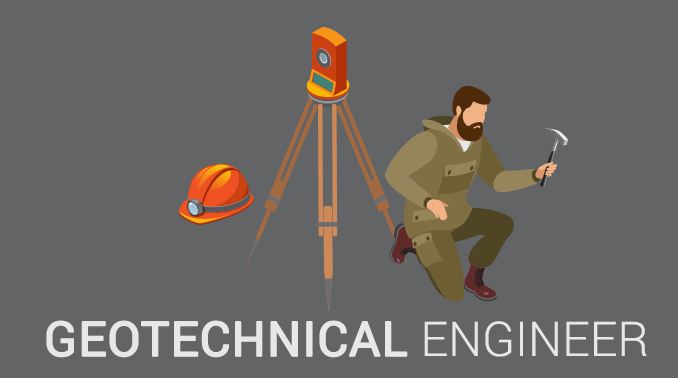Unknown Facts About Geotheta
Unknown Facts About Geotheta
Blog Article
Get This Report on Geotheta
Table of ContentsOur Geotheta StatementsSome Known Incorrect Statements About Geotheta Some Known Questions About Geotheta.The 8-Minute Rule for GeothetaLittle Known Questions About Geotheta.

They carry out website examinations, gather samples, carry out research laboratory examinations, and examine information to evaluate the suitability of the ground for construction projects - Tailings Engineer. Based upon their findings, geotechnical designers supply referrals for foundation design, slope stability, keeping structures, and reduction of geotechnical hazards. They work together with other specialists, such as designers, structural designers, and building and construction groups, to ensure that geotechnical factors to consider are integrated into the general job style and execution
By assessing the habits and residential properties of soil and rock, they can determine possible geotechnical threats such as landslides, dirt settlement, or incline instability. Their expertise assists prevent failures or crashes that might threaten lives and residential or commercial property. Right here are some detailed duties and duties of a geotechnical engineer: Website Examination: Geotechnical engineers conduct website investigations to gather data on subsurface problems.
They translate the information to comprehend the buildings and actions of the soil and rock, including their strength, leaks in the structure, compaction qualities, and groundwater problems. Geotechnical Evaluation and Design: Geotechnical designers examine the information gathered during website examinations to examine the stability and viability of the site for building and construction jobs. They do geotechnical calculations and modeling to examine elements such as birthing ability, negotiation, slope stability, lateral planet pressures, and groundwater circulation.
Not known Details About Geotheta
Structure Design: Geotechnical engineers play an important function in designing foundations that can safely support the intended structure. They assess the dirt conditions and tons demands to determine the suitable structure type, such as shallow foundations (e.g., footings), deep foundations (e.g (https://www.provenexpert.com/geotheta/)., heaps), or specialized methods like soil enhancement. They think about variables such as settlement limitations, birthing capacity, and soil-structure communication to create optimal foundation layouts
They review construction plans, screen website activities, and conduct area examinations to verify that the layout referrals are followed. If unanticipated geotechnical problems occur, they assess the situation and give recommendations for removal or changes to the style. Danger Evaluation and Reduction: Geotechnical engineers evaluate geotechnical threats and threats related to the task site, such as landslides, liquefaction, or dirt disintegration.

Collaboration and Interaction: Geotechnical designers work closely with other professionals associated with a project, such as architects, architectural engineers, and construction groups. Effective communication and collaboration are vital to incorporate geotechnical factors to consider into the general project layout and building procedure. Geotechnical designers supply technical know-how, answer inquiries, and make sure that geotechnical needs are satisfied.
Some Ideas on Geotheta You Need To Know
Right here are some kinds of geotechnical engineers: Structure Designer: Foundation designers specialize in developing and evaluating structures for structures. They examine the dirt conditions, tons requirements, and website characteristics to identify one of the most ideal structure kind and design, such as shallow foundations, deep foundations, or specialized methods like stack structures.
They assess the factors influencing incline stability, such as dirt buildings, groundwater problems, and incline geometry, and establish techniques to stop incline failures and reduce dangers. Quake Designer: Quake engineers specialize in analyzing and developing structures to hold up against seismic pressures. They analyze the seismic hazard of a site, examine soil liquefaction possibility, and develop seismic design requirements to make certain the safety and durability of structures during quakes.
They do field testing, accumulate examples, and analyze the accumulated information to characterize the soil buildings, geologic formations, and groundwater conditions at a site. Geotechnical Instrumentation Designer: Geotechnical instrumentation engineers focus on tracking and gauging the behavior of soil, rock, and structures. They install and maintain instrumentation systems that keep an eye on elements such as soil settlement, groundwater degrees, slope motions, and structural displacements to analyze performance and provide early cautions of possible issues.
The smart Trick of Geotheta That Nobody is Talking About
They conduct tests such as triaxial tests, debt consolidation tests, direct shear tests, and permeability examinations look at this website to gather information for geotechnical evaluation and design. Geosynthetics Designer: Geosynthetics designers specialize in the design and application of geosynthetic materials, such as geotextiles, geogrids, and geomembranes. They make use of these products to improve soil stability, reinforce inclines, provide drainage services, and control disintegration.
They tend to be investigatory people, which implies they're intellectual, introspective, and curious. They are interested, systematic, reasonable, analytical, and sensible. Several of them are additionally social, implying they're kind, generous, cooperative, individual, caring, useful, understanding, skillful, and pleasant. Does this seem like you? Take our complimentary career examination to learn if geotechnical engineer is just one of your leading occupation matches.
In the workplace atmosphere, geotechnical designers make use of specialized software program tools to perform computations, produce designs, and assess information. They prepare reports, testimonial job requirements, interact with customers and employee, and coordinate job activities. The workplace setting gives a conducive setting for research, analysis, and collaboration with various other professionals associated with the job.
Some Ideas on Geotheta You Need To Know
They frequently visit task websites to perform site investigations, examine geotechnical conditions, and gather information for analysis. These check outs include traveling to different places, occasionally in remote or difficult terrains. Geotechnical designers may carry out soil sampling, conduct examinations, and monitor construction activities to ensure that the geotechnical elements of the task are being executed properly.
Geotechnical engineers likewise function in specialized geotechnical research laboratories. In these centers, they carry out experiments, perform examinations on dirt and rock examples, and examine the engineering residential or commercial properties of the materials. Geotechnical laboratory engineers function thoroughly in these environments, handling testing equipment, operating instruments, and recording information. They collaborate with other research laboratory team to ensure exact and reliable testing outcomes.
Report this page